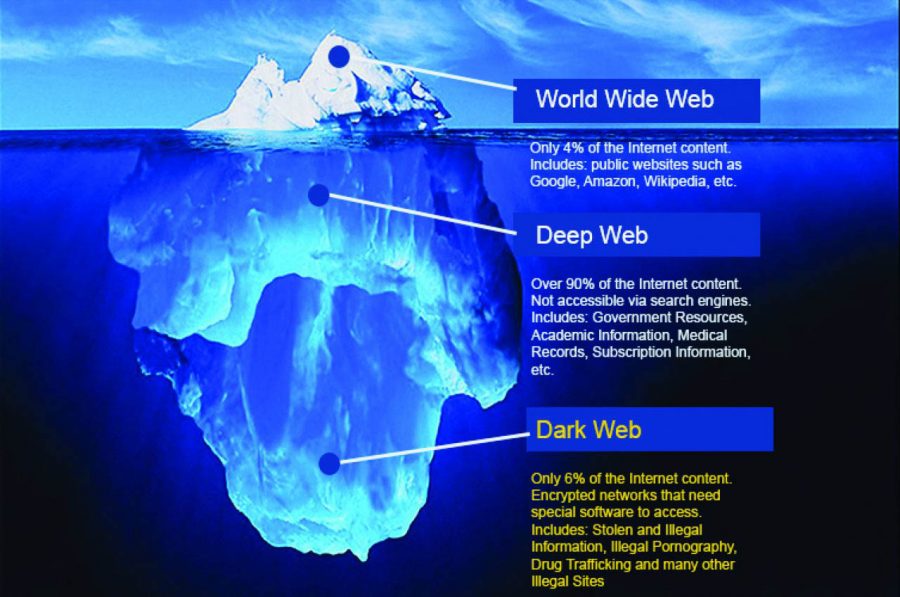What the Internet Doesn’t Show You

Source: https://betanews.com
February 14, 2019
You’re sitting down at your computer, only to find what is on the surface of the internet: Google, Wikipedia, Bing, and the usual social media networks such as Instagram and Twitter. Yet, suddenly you come across a video or website informing you about the dark web.
What is the dark web?
The dark web is a part of the internet that can’t be easily found by just going onto a search engine like Google. It is known to be only accessible with certain software, such as Tor, that helps users remain untraceable and anonymous.
How can someone access in the dark web?
According to the article, “What is the Dark Web? How to Access it and What You’ll Find”, posted on the CSO website, for IT professionals defending themselves from cyberattack <www.csoonline.com>, “The Tor browser routes your web page requests through a series of proxy servers operated by thousands of volunteers around the globe, rendering your IP address unidentifiable and untraceable.” The article also states the Tor browser can be downloaded for free at www.torproject.org.
Computer programming teacher Mr. Jara said, “The dark web is just a section of the internet that hasn’t been indexed, so unless you go to a page that has viruses, nothing will happen to your computer. Your computer is just as safe as visiting Google.”
The consequences of going on the dark web
Surfing the dark web is not illegal. Yet, the things that are being sold certainly are, such as child pornography, drugs, and weapons.
Having child pornography downloaded and stored, according to The United States Department of Justice, you will face up to a minimum of 15 years to 30 years maximum in prison. The purchase of drugs is indeed outside the law and prohibited, and you will face up to 10 years in prison with a fine of $20,000. Weapons that are sold on the dark web are all unlicensed, and most likely all smuggled from other countries, which can lead to two years in jail or prison and a fine of up to $1,000.

What goes on in the dark web?
Anything can be found on the dark web—from buying credit card numbers, Social Security numbers, all types of drugs, guns, and counterfeit money, to hiring a hitman or a hacker to attack any electronic device for you.
An anonymous senior male said he has entered the dark web only once in his life. “I was about 15 years old when I used the Tor browser that helped me stay protected. I first thought about it in my head before entering it, thinking it wouldn’t be that bad yet. The things I encountered were super illegal. For example, a website I ended up in was people selling fake passports,” he said. “I would never go on it again, because it really isn’t worth the risk. Thinking about it today makes me think how dumb the idea was.”
Another anonymous senior male said he has entered the dark web twice. “A lot of people have this false idea of what the dark web is. As long as you are using an anonymous browser such as Tor and being safe, you can have a pleasant experience. I did not encounter anything I shouldn’t have, per se. The worst thing I found was just drugs, and not even hardcore drugs, only the common cocaine and weed for sale. I mostly just encountered blogs of users discussing information about the drugs they were selling back and forth to each other. I even encountered a website dedicated to selling banned books,” he said.
The people behind the dark web
All types of people can be found on the dark web. According to the article “The Dangers of The Dark Web” posted on the website for Science X, a science, technology, and research news service <www.phys.org>, the dark web was originally created by military researchers in the 1990s to allow intelligence operatives to exchange information completely anonymously.
Now, people use the dark web for different reasons. Criminals make a business out of illegal organized crime such as hacking, killing, human trafficking, human experiments, the black market, and so much more.
On a positive note, the article states, “It’s also been used by whistle-blowers as well as activists during the Arab Spring, who harnessed the platform’s power to organize demonstrations and disseminate information anonymously.”





